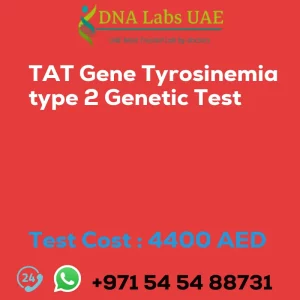ABCA1 Gene Tangier disease Genetic Test
Test Name: ABCA1 Gene Tangier disease Genetic Test
Components: DNA sample from blood
Price: 4400.0 AED
Report Delivery: 3 to 4 Weeks
Method: NGS Technology
Test Type: Metabolic Disorders
Doctor: General Physician
Test Department: Genetics
Pre Test Information: Clinical History of Patient who is going for ABCA1 Gene Tangier disease NGS Genetic DNA Test. A Genetic Counselling session to draw a pedigree chart of family members affected with Tangier disease.
Test Details
The ABCA1 gene is responsible for producing a protein called ATP-binding cassette transporter A1. This protein plays a crucial role in the transport of cholesterol and other lipids out of cells, particularly in the formation of high-density lipoproteins (HDL), also known as “good cholesterol.”
Tangier disease is a rare genetic disorder caused by mutations in the ABCA1 gene. These mutations lead to a decrease in the production or function of the ABCA1 protein, resulting in a reduced ability to transport cholesterol and other lipids out of cells. As a result, individuals with Tangier disease typically have very low levels of HDL cholesterol and an accumulation of cholesterol in various tissues, particularly in the tonsils and the liver.
NGS (Next-Generation Sequencing) genetic testing is a type of genetic test that uses advanced sequencing technology to analyze multiple genes simultaneously. In the case of Tangier disease, NGS genetic testing can be used to identify mutations in the ABCA1 gene that may be responsible for the disease. By sequencing the entire coding region of the ABCA1 gene, NGS can identify specific mutations or variants that are associated with Tangier disease. This information can be used for diagnosis, genetic counseling, and potentially for the development of targeted therapies in the future.
It is important to note that NGS genetic testing is typically performed by a medical professional or genetic counselor who can interpret the results and provide appropriate guidance and recommendations based on the individual’s specific circumstances.
| Test Name | ABCA1 Gene Tangier disease Genetic Test |
|---|---|
| Components | |
| Price | 4400.0 AED |
| Sample Condition | Blood |
| Report Delivery | 3 to 4 Weeks |
| Method | NGS Technology |
| Test type | Metabolic Disorders |
| Doctor | General Physician |
| Test Department: | Genetics |
| Pre Test Information | Clinical History of Patient who is going for ABCA1 Gene Tangier disease NGS Genetic DNA Test A Genetic Counselling session to draw a pedigree chart of family members affected with Tangier disease |
| Test Details |
The ABCA1 gene is responsible for producing a protein called ATP-binding cassette transporter A1. This protein plays a crucial role in the transport of cholesterol and other lipids out of cells, particularly in the formation of high-density lipoproteins (HDL), also known as “good cholesterol.” Tangier disease is a rare genetic disorder caused by mutations in the ABCA1 gene. These mutations lead to a decrease in the production or function of the ABCA1 protein, resulting in a reduced ability to transport cholesterol and other lipids out of cells. As a result, individuals with Tangier disease typically have very low levels of HDL cholesterol and an accumulation of cholesterol in various tissues, particularly in the tonsils and the liver. NGS (Next-Generation Sequencing) genetic testing is a type of genetic test that uses advanced sequencing technology to analyze multiple genes simultaneously. In the case of Tangier disease, NGS genetic testing can be used to identify mutations in the ABCA1 gene that may be responsible for the disease. By sequencing the entire coding region of the ABCA1 gene, NGS can identify specific mutations or variants that are associated with Tangier disease. This information can be used for diagnosis, genetic counseling, and potentially for the development of targeted therapies in the future. It is important to note that NGS genetic testing is typically performed by a medical professional or genetic counselor who can interpret the results and provide appropriate guidance and recommendations based on the individual’s specific circumstances. |








